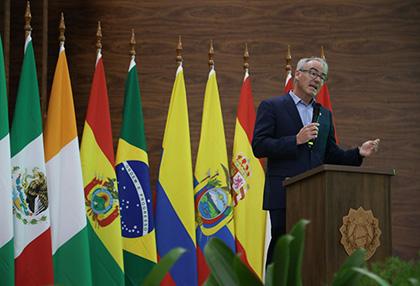Medium- and heavy-duty trucks are major contributors to greenhouse gas emissions and air pollution. Yet California’s policies to phase out fossil fuel-powered trucks in favor of zero-emission models have been undermined by recent federal actions, including a congressional vote to terminate California’s mandate on truck makers to produce zero-emission models and a rollback of many federal tax incentives for these vehicles. Furthermore, in January 2025 the state withdrew from U.S.
Climate change is making life in cities hotter and more dangerous, but cities—Los Angeles included—have not yet adequately responded.
The risk and incidence of heat-related illnesses, such as heat rash, heat cramps, fainting, heat exhaustion, and heat stroke, will increase apace if measures are not taken to reduce their severity and likelihood. These risks fall disproportionately on low-income communities of color.
-
J.D Environmental Law

World diplomats are descending on the Amazonian city of Belém this month for COP30, the annual United Nations climate conference, at a critical juncture in the fight against global warming. Joining them are UCLA researchers with an outsized and powerful presence thanks to the organization they lead called the Governors’ Climate and Forests Task Force.
The GCF Task Force, a unique project that came to UCLA School of Law in 2022, is a subnational alliance of governors from around the world who work together on policies to protect forests.
Staff and faculty of the UCLA Emmett Institute filed an amicus brief in the U.S. Court of Appeals for the Ninth Circuit defending the right of air pollution regulators to set important standards under the Clean Air Act to protect public health. The case is Rinnai America Corp.et al. v. South Coast Air Quality Management District, and it involves a challenge to South Coast AQMD's recent efforts to reduce nitrogen oxides (NOx) pollution by accelerating the transition to zero-NOx-emissions models for certain water heaters and boilers.
-
J.D Environmental Law
Announcing the UCLA Emmett Institute’s STOP Methane Project, a user-friendly ranking of super-polluting methane emissions across multiple sectors.
Methane accounts for about one-third of global warming. And because methane only stays in the atmosphere for a short time, cutting that potent greenhouse gas provides a critical opportunity to reduce near-term climate change.
When climate-fueled disasters strike, local news coverage helps educate residents about the causes and informs public opinion about policy responses. This was true in early January 2025 when Los Angeles was devastated by the Eaton and Palisades fires.
So, how did local news coverage frame these disasters? This survey of more than 600 stories and videos by The Los Angeles Times found that about 14% of that news content made mention of “climate change” or “global warming.”
Join us on November 3 at UCLA School of Law for a special evening with Yurok attorney and Native American civil rights activist Amy Bowers Cordalis. Just days after the release of her new book The Water Remembers, Amy will share her story of fighting for the Klamath River and affirming Yurok sovereignty.
🗓 November 3 | UCLA School of Law
📍 RSVP NOW: bit.ly/UCLAwaterremembers
⚠️ Please note: This event will not be livestreamed. Lunch will be provided for RSVP'd guests only
.png)